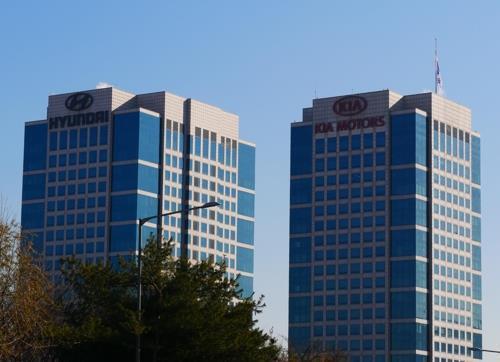Due to shortage of parts from China
Hyundai Motor halted the assembly lines for the production of the carmaker's independent brand Genesis's sedan models at its No. 5 plant in Ulsan, 414 kilometers southeast of Seoul, from Tuesday, a company spokesman said over the phone.
"The company and the union are in consultations for a possible suspension of additional lines at its Ulsan plants, depending on future developments of the coronavirus," he said.
Hyundai Motor has seven domestic plants -- five in Ulsan, one in Asan and one in Jeonju -- and 10 overseas plants -- four in China, one in the United States, one in the Czech Republic, one in Turkey, one in Russia, one in India and one in Brazil. Their combined capacity reaches 5.5 million vehicles.
In an email message sent to workers at the Ulsan plants on Monday, Vice President Ha Eon-tae, head of Hyundai's main plant, said it the suspension of certain car assembly lines in Ulsan is "inevitable" as South Korean parts suppliers in China have suspended production due to the Chinese government's restrictions on plant operations amid the coronavirus scare.
This undated file photo shows Hyundai and Kia's headquarters buildings in southern Seoul. (PHOTO NOT FOR SALE) (Yonhap)
Kia Motors Corp., which is 34 percent owned by Hyundai, started reducing output at its plants in Hwaseong and Gwangju, outside of Seoul, for the same reasons, according to the union.
The company didn't provide details about the suspension of assembly lines.
Kia has seven domestic plants -- two in Gwangmyeong, three in Hwaseong and three in Gwangju -- and seven overseas ones -- three in China and one each in the U.S., Slovakia, Mexico and India. Their overall capacity reaches 3.84 million units.
Hyundai and Kia, which together form the world's fifth-biggest carmaker by sales, are concerned about an extended shortage of auto components from their Korean suppliers in China.
Hyundai canceled overtime work over the weekend to produce the flagship Palisade sport utility vehicle at the Ulsan plant in an initial countermeasure to manage its parts inventories.
The fallout from the virus could deal a further blow to Hyundai and Kia, which have been struggling with declining sales in China, the world's biggest automobile market, in the past three years.
In China, the carmakers' sales remained weak due to the lingering impact of political tensions between Seoul and Beijing over the deployment of an advanced U.S. missile defense system, called THAAD, in South Korea in 2017.
Hyundai and Kia's combined sales in China fell 22 percent to 909,000 vehicles last year from 1,161,000 units a year earlier. The two carmakers aim to sell 7.5 million autos globally this year, higher than the 7.2 million units they sold last year.
In April last year, Hyundai shut down one of its five plants in China, and in May, Kia suspended one of its three plants there due to lower demand.
Since emerging out of the Chinese city of Wuhan late last year, the new coronavirus has killed at least 425 and infected 20,438 people in China as of Tuesday and reached 24 countries, as far away as the U.S.
So far, South Korea has reported 15 confirmed coronavirus cases as of Tuesday.



